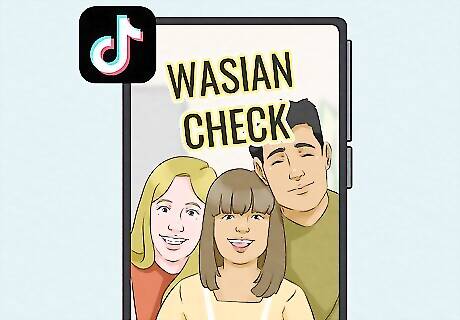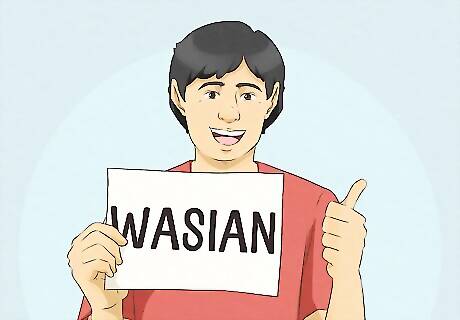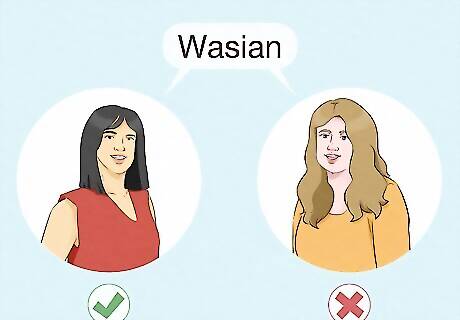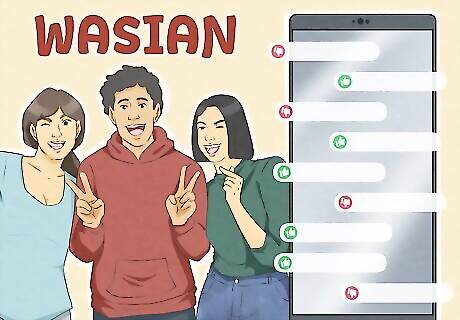
views
What does “Wasian” mean?

“Wasian” is a slang term for someone of both white and Asian descent. “Wasian” is a portmanteau (a word made by combining two other words) of “white” and “Asian.” The term usually describes someone who is biracial, with one white parent and one Asian parent. However, “Wasian” can be used to describe anyone of white and Asian ancestry, including someone with two Wasian parents, or someone with one Wasian parent and one parent who is either white or Asian.
Where did the term “Wasian” come from?

The term “Wasian” likely originated on the internet and spread through TikTok. Although it’s hard to trace the exact origins of the term, it seems to have first gained traction online in the 2010s. It later gained a burst of popularity in the early 2020s, when the “Wasian Check” trend went viral on TikTok. To participate, users who were both white and Asian began posting videos of themselves with hashtags like #wasian or #wasiancheck. Some also used a TikTok sound created by user @nikokatsuyoshi, in which he says, “Hey yo, Wasian check,” and then music plays (here’s his OG video for reference). Some users also shared old photos of their white parent and their Asian parent, followed by a video of themselves (like this example by user @callicottx0809). Others shared stories from their past about the unique experience of growing up Wasian (like this example by user @adamjfromthebay).
Is “Wasian” offensive?

Some people who are Asian and white find the term to be harmless. Some people of white and Asian ancestry have embraced the term, seeing it as a way to identify with their heritage and celebrate their multiracial identity, while also connecting with others on social media who have similar experiences.

Other people who are Asian and white dislike the term and find it offensive. Some people feel like the term “Wasian” doesn’t represent the nuances of their identity, or that it lumps several different communities together in a way that doesn’t capture their unique experiences. For example, someone who is white and Japanese has a different experience from someone who is white and Korean, white and Filipino, or white and Vietnamese, so some biracial Asian Americans find an umbrella term like “Wasian” to be lacking. Others have noticed that the “Wasian Check” social media trend has drawn concerning comments from people outside the AAPI community, including racist comments, comments that perpetuate stereotypes, and comments that fetishize mixed Asian Americans.

Whether or not “Wasian” is offensive often depends on who says it. For example, some people who are Asian and white don’t see the term as offensive when a member of the community uses it, but do see it as offensive when someone outside the community uses it. As a result, it’s usually best to avoid using “Wasian” unless you’re someone of both Asian and white descent yourself.
Final Thoughts

As someone who fits the description of “Wasian,” (I’m half-Filipino and half-white), I don’t personally find the term offensive, and I also think it’s cool to see people with similar experiences to mine connecting over social media. However, I totally understand why some people of white and Asian descent would find the term offensive, and that’s completely valid, too. If you find the term to be a fun way to connect with others who have similar experiences, it’s totally fine to self-identify this way. Just remember that others who are both Asian and white might not feel the same, so ask them if they’re comfortable with the term before using it around them. On the flip side, if you’re not comfortable with the term “Wasian” and prefer not to use it to describe your heritage, that’s completely okay and understandable, too. It all depends on what you’re most comfortable with! And of course, if you’re not someone of Asian and white ancestry, avoid using the term “Wasian” to describe someone unless they’ve specifically told you they’re comfortable with that, since many mixed Asian and white people see “Wasian” as a term meant specifically for members of the community.




















Comments
0 comment